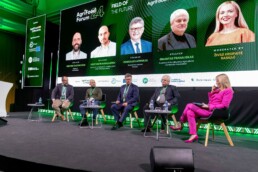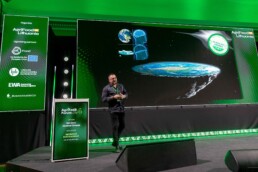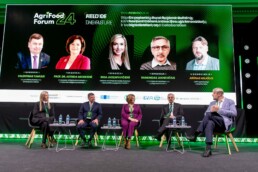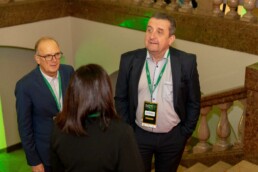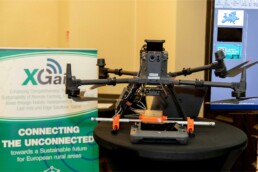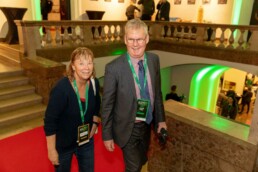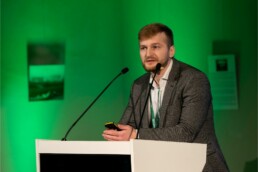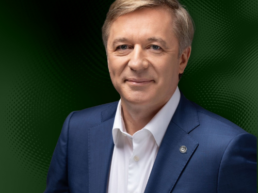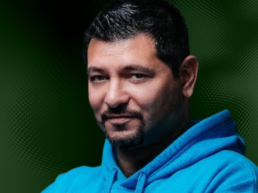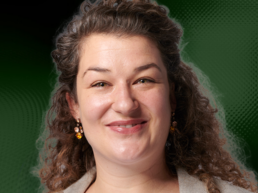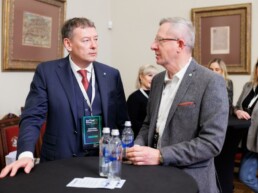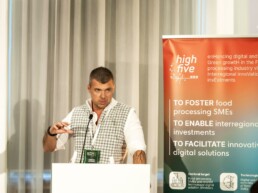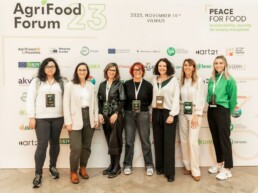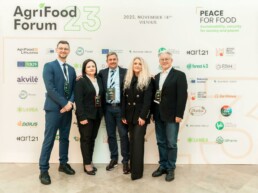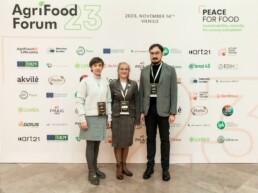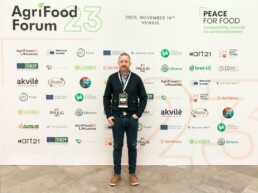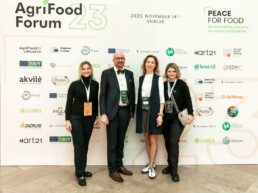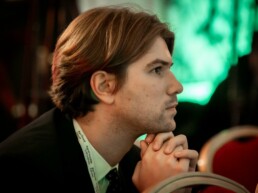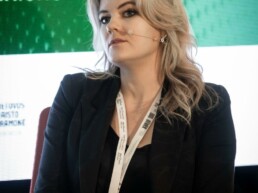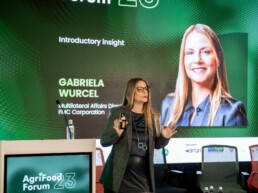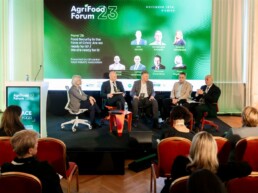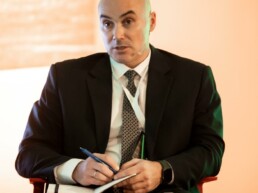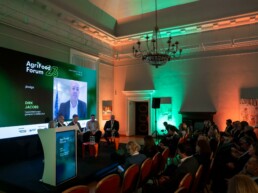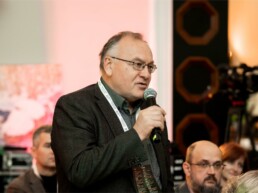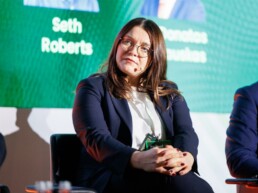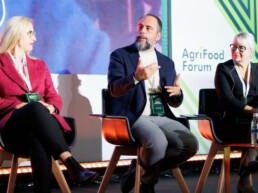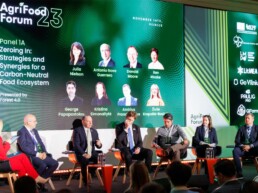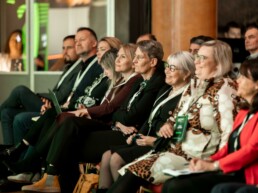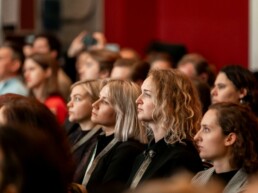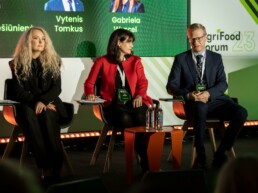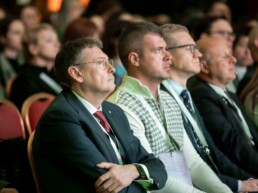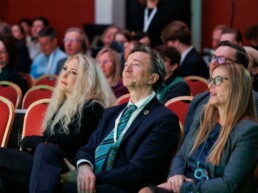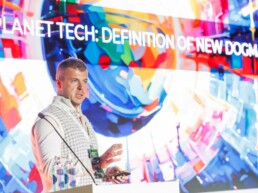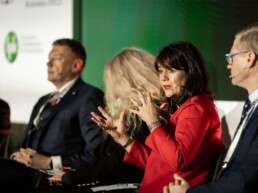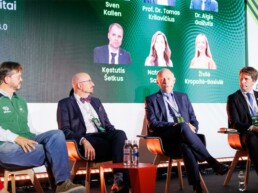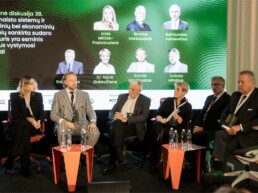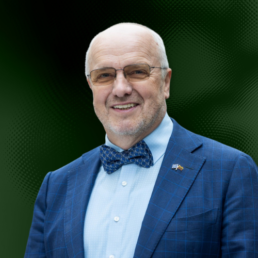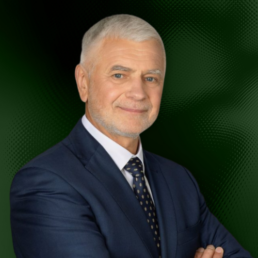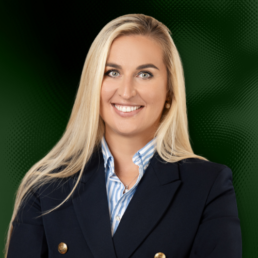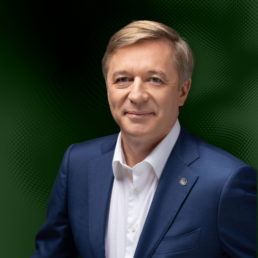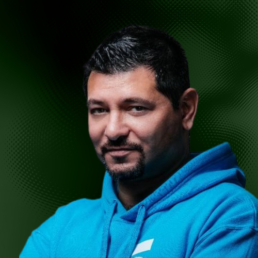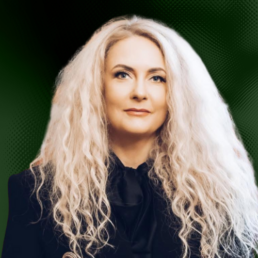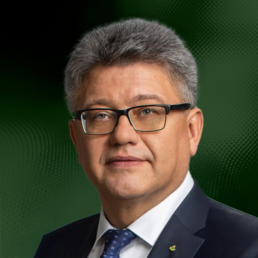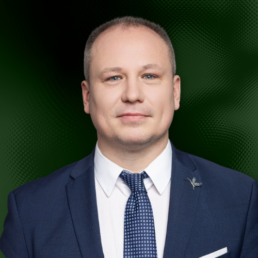AgriFood Forum is the most important annual event in the Baltic region, now in its sixth year, dedicated to shaping the future of the agri-food sector through dialogue, collaboration, and innovation.
AgriFood Forum 2025 will become the key meeting place for policymakers, business leaders, scientists, and innovators, where the long-term vision for a sustainable, resilient, and secure agri-food system in Lithuania and Europe will be defined.
For the first time taking place at the Palace of the Grand Dukes of Lithuania, the event will highlight the importance of public-private partnerships, investments, and science cooperation in shaping policies that foster innovation, food security, and a socially just transformation.
THE FIELD OF THE FUTURE: Directions of Innovation, Policy, and Investment for a Sustainable, Resilient, and Secure Agri-Food System in Lithuania and Europe
This year’s theme – “THE FIELD OF THE FUTURE: Directions of Innovation, Policy, and Investment for a Sustainable, Resilient, and Secure Agri-Food System in Lithuania and Europe” – invites participants to view innovation as a multi-level process connecting local, regional, national, and international developments.
Main objectives of the Forum:
- To shape agri-food innovation and food security policy in Lithuania and Europe.
- To strengthen investments in sustainable, resilient, and secure solutions.
- To promote multi-level innovation growth – from company to European and global scale.
- To empower regions and rural areas to become ecosystems of innovation and food security.
- To enable people to drive change – encouraging generational renewal, gender equality, and social justice.
- To enhance international cooperation and European leadership in food security.
The event aims to bring together more than 300 participants from over 20 EU Member States, representing nearly 100 organizations and companies.
During the event, there will be plenty of networking opportunities – including coffee breaks, lunch, and the GALA dinner, where forum participants will be able to discuss key issues and establish connections for future collaboration. An exhibition area will also be available, and guests will have the opportunity to visit the unique Palace of the Grand Dukes of Lithuania.
We expect the upcoming AgriFood Forum to yield multiple positive outcomes:
The forum will contribute in the development of strategic recommendations for policymakers, focusing on promoting National and Regional Digital and Innovation Strategies for the agrifood sector. These recommendations will aim to ensure coherence across regulatory frameworks, simplify bureaucratic processes, and create an enabling environment that fosters the adoption of sustainable technologies and practices.
The forum will drive collaboration among government bodies, businesses, and civil society to support the digital and innovation transformation of agrifood. Participants will establish frameworks for cross-sectoral partnerships that emphasize building resilient regional ecosystems and a more coherent public-private response to global challenges in the agrifood sector
By promoting inclusive access to technological and non-technological innovations, the forum will provide pathways for all stakeholders, including smallholder farmers, to benefit from the twin transition. Initiatives will include expanding digital infrastructure in rural areas, capacity building, and encouraging micro-entrepreneurship within the agrifood value chain to support underserved communities.
A special emphasis will be placed on empowering women entrepreneurs through showcasing ongoing successes from the EWA and Grassceiling initiatives. This outcome will underline the role of women-led innovations in driving sustainable change and provide actionable steps to increase female participation in the agrifood innovation ecosystem.
The forum will develop actionable strategies to strengthen value chain relationships, enhance communication between stakeholders, and foster an environment that encourages data sharing, collaboration, and the adoption of new technologies. By focusing on both technological and innovative approaches, the forum will ensure that agrifood systems are prepared to withstand future shocks, adapt to changing conditions, and deliver on sustainability goals.
Participants will gain practical insights into how AI, data science, and other advanced technologies can enhance decision-making, resource management, and efficiency in the agrifood sector. The forum will also address the barriers to adoption and explore how innovation can be scaled up to benefit all stakeholders along the value chain.
Emphasizing the importance of skills development, the forum will provide recommendations for farmer-centric training initiatives that empower stakeholders with the necessary skills to effectively utilize advanced technologies and adopt innovative practices. These initiatives will be designed to address the diverse needs of different farming communities, ensuring that no one is left behind in the transition to a more sustainable agrifood future.
By bringing together policymakers, industry leaders, academics, and innovators, AgriFood Forum 2024 will serve as a catalyst for sustainable change, driving AI-powered solutions and overall innovations, and fostering cross-sectoral cooperation for a more resilient, equitable, and sustainable food future.

Speakers
Juozas Olekas
Bronius Markauskas
Andrius Pranckevičius
Adina Golombeck-Tauyatswala
Karri Kallio
*The list of speakers will be updated.

Agenda
08:00 - 09:00 Registration & B2B matchmaking breakfast
09:00 – 09:30 Opening remarks
09:30 – 10:30 High-Level Policy Opening Panel: Building Europe’s Food Security Through Innovation, Policy, and Investment
Objective:
This high-level opening session will set the strategic direction for the AgriFood Forum 2025, uniting top policymakers and institutional leaders from the European Union, the OECD, and Lithuania.
It will define how multi-level innovation, policy coherence, and strategic investment can strengthen Europe’s food system resilience, security, and competitiveness in an increasingly complex global environment.
The discussion will provide the political and institutional framing for the Forum — linking the OECD’s global agenda, the EU’s Green Deal, Farm to Fork Strategy, and Strategic Dialogue on the Future of Agriculture, as well as Lithuania’s national ambitions as a regional leader in agrifood innovation and bioeconomy development.
10:10 - 11:30 High-Level Opening Panel: Multi-Level Innovation as a Policy Framework: From Firm to World – How Policy Can Enable Innovation at Every Level of the Agrifood System
This session opens the Forum by translating the OECD Oslo Manual’s four levels of innovation into a policy and ecosystem framework for Europe’s agrifood transformation.
It connects global policy leadership (OECD, EC) with European and regional implementation (clusters, ecosystems, innovation networks) — showing how to turn policy ambition into practical, scalable impact.
Key Discussion Themes:
- Connecting innovation levels: how to align “new-to-firm” to “new-to-world” innovations through coherent policy and support frameworks.
- Clusters as system orchestrators: why European and regional clusters are essential intermediaries between policy and enterprise innovation.
- Policy–investment alignment: ensuring that European, national, and regional programmes reinforce one another.
- OECD and EU cooperation: creating shared metrics and governance models for food system resilience.
11:30 - 11:40 Coffee break
Hall A
Hall B
11:40 - 12:40 Panel 2: Regions and Living Labs as Accelerators of Multi-Level Innovation
How regional ecosystems turn policy into practice across Europe’s agrifood value chains.
Building on the policy framing of Panel 1, the goal is to show how regional ecosystems and Living Labs drive Europe’s agrifood transformation by connecting innovation policy to enterprise-level action. Using the OECD’s four levels of innovation (new-to-firm, region, market, world), this panel highlights how local experimentation and interregional cooperation make the system work in practice. By doing so, the discussion sets the stage for investment topics explored in Panel 3.
Key Discussion Themes:
- From policy to pilots: how EU and national strategies are translated into regional action.
- Living Labs as the “doing infrastructure” of innovation — co-creation, testing, and de-risking new technologies.
- Interregional learning (e.g., SIXFOLD): scaling impact through collaboration and shared methodology.
- Bridging innovation and funding: how intermediaries and agencies support SMEs and start-ups.
- Learning from evidence: what OECD and regions can jointly measure to track system transformation
12:40 - 14:00 Networking Lunch
14:00 - 14:25 Keynote Presentation
14:25 - 15:30 Panel 3 Investing in the Field of the Future
Financing and scaling multi-level innovation for Europe’s sustainable and secure agrifood system.
The goal is to explore how public and private investment can accelerate innovation across all levels — from firm-level adoption to global breakthroughs — and how policy, industry, and finance can jointly enable a resilient and sustainable agrifood future. The discussion will focus on creating investment coherence: aligning European, national, and private financial mechanisms to scale successful innovations and strengthen food system resilience. This panel will also explore how Lithuania positions itself as a hub for sustainable agrifood investments.
Key Discussion Themes:
- How to bridge innovation and investment: turning policy priorities into investable propositions.
- The role of industry in mobilising private capital for sustainable agrifood transformation.
- Blended finance and de-risking: how to use public instruments (InvestEU, Horizon, national funds) to attract private co-investment.
- National and regional investment ecosystems: how they can connect SMEs and start-ups to European funding.
- Lessons for OECD and EU policymakers on creating consistent investment frameworks for food security and innovation.
15:30 - 16:30 Panel 4: Empowering People and Networks for Europe’s Food Future
Skills, inclusion, and leadership for a resilient and innovative agrifood ecosystem.
This closing panel spotlights the human dimension of transformation — the people, skills, and communities that make innovation happen. It explores how Europe can empower the next generation of agrifood leaders, ensuring that technological and policy advances are matched by education, inclusion, and collaboration across regions.
Key Discussion Themes:
- Skills for transformation: how universities, clusters, and training programmes prepare the workforce for digital-green agrifood transitions.
- Youth and generational renewal: making agrifood careers attractive to young innovators and entrepreneurs.
- Women in agrifood: strengthening leadership, visibility, and inclusive innovation.
- Entrepreneurial and soft skills: creativity, co-creation, and cross-sector collaboration.
- Connected networks: how organisations build learning communities across Europe.
16:30 - 17:00 Concluding session
10:30 - 11:30 PANEL 1B EWA Opening panel discussion. Empowering Women in the AgriFood Sector: Driving Innovation and Sustainability
The panel will spotlight the critical role of women in shaping the future of the agrifood sector, focusing on their leadership in driving sustainable and innovative solutions. With an emphasis on overcoming gender barriers, fostering inclusivity, and enabling women-led initiatives, the discussion will highlight actionable strategies to empower women entrepreneurs and leaders. The session will also explore how supportive policies and financial resources can catalyze innovation and sustainability in the agrifood ecosystem.
Objectives:
Showcase the leadership and innovation of women in the agrifood sector, emphasizing their contributions to sustainability.
Discuss strategies for addressing gender inequities and fostering inclusivity in the agrifood value chain.
Highlight the role of policy and financial frameworks in empowering women-led ventures and supporting innovation.
Inspire collaboration and action to create an enabling environment for women entrepreneurs and leaders in agrifood.
Topics for Discussion:
Leadership and Innovation in AgriFood:
- Success stories of women leaders driving impactful and sustainable agrifood solutions.
- How women’s leadership is transforming traditional practices and fostering innovation in the sector.
Overcoming Gender Barriers:
- Identifying challenges faced by women in agrifood, including cultural, structural, and financial barriers.
- Strategies and best practices for reducing gender inequities and supporting inclusivity at all levels.
Fostering Women-Led Innovation:
- The role of supportive policies, funding mechanisms, and mentorship in enabling women-led ventures.
- Opportunities for collaboration to accelerate innovation and create lasting impact in agrifood sustainability.
Fire starter: Kristina Šermukšnytė-Alešiūnienė | CEO AgriFood Lithuania, Vice-President European Clusters Allance
Kristina Šermukšnytė-Alešiūnienė | CEO AgriFood Lithuania, Vice-President European Clusters Allance
Prof. Professor Sally Shortall | FAcSS, Duke of Northumberland Chair of Rural Economy, Centre for Rural Economy, School of Agriculture, Food and Rural Development, Newcastle University
Alicja Krakowska | Project Manager – Empowering Women in Agrifood (EWA) Programme European Institute of Innovation & Technology (EIT) Food
Daiva Jakaitė | Head of European Parliament Liaison Office in Lithuania
Moderated by Donatas Staniulis | Head of Business Development at Caszyme
11:40 - 12:45 PANEL 2B Pathways to Sustainability: Bioeconomy, Regenerative Practices, and Innovation for Quality Food Systems
The panel panel will explore diverse approaches to achieving sustainability in the agrifood sector, emphasizing bioeconomy strategies, regenerative agricultural practices, and innovative solutions. The discussion will address the challenges of greenwashing while focusing on authenticity and accountability in achieving sustainable outcomes. Expert perspectives will highlight actionable strategies for businesses, policymakers, and stakeholders to create high-quality food systems that align with environmental and social goals.
Objectives:
Highlight the potential of bioeconomy and regenerative agriculture to reshape agrifood systems sustainably.
Discuss the role of innovative technologies, including digital tools and big data, in enhancing transparency and efficiency.
Address the issue of greenwashing and provide frameworks for achieving genuine, measurable sustainability in agrifood practices.
Explore policy and legal perspectives to support sustainability goals, ensuring compliance and fostering trust.
Inspire cross-sectoral collaboration among businesses, policymakers, and researchers to achieve transformative sustainability.
Discussion Topics:
Bioeconomy and Regenerative Practices:
- The role of bioeconomy strategies in reducing environmental impact and optimizing resource use.
- Practical applications of regenerative agricultural practices to enhance soil health and ecosystem resilience.
Legal and ESG Frameworks for Sustainability:
- Insights into regulatory challenges and opportunities for businesses aiming to adopt sustainable practices.
- How ESG (Environmental, Social, Governance) compliance can drive accountability and credibility in the agrifood sector.
Digital Innovation and Big Data:
- Leveraging digital tools and big data for monitoring, traceability, and sustainability reporting in agrifood systems.
- Case studies showcasing the integration of digital innovation to enhance efficiency and quality in food production.
Greenwashing vs. Authentic Sustainability:
- Identifying and avoiding greenwashing practices in the agrifood sector.
- Strategies to ensure measurable, verifiable outcomes that align with sustainability goals.
Policy and Collaborative Approaches:
- How European policies and Horizon Europe projects can support sustainable innovation in agrifood.
- The importance of partnerships between legal, business, and research stakeholders to scale effective solutions.
Fire starter: Vilma Sabaliauskienė | Widen Partner / Attorney at Law / Head of Environmental and ESG Practice
Vilma Sabaliauskienė | Widen Partner / Attorney at Law / Head of Environmental and ESG Practice
Dr. Sjaak (J.) Wolfert | Theme Ambassador and Strategic Senior Scientist on Digital Innovation in Agri-Food Wageningen Economic Research, Wageningen University & Research
Virginija Lukšienė | Director EKOAGROS
Mindaugas Maciulevičius | Director of the Lithuanian Farm Quality Agricultural Cooperative
Krešimir Kovač | Project Manager, Senior Expert at DIH Agrifood Croatia
Moderated by Živilė Kropaitė-Basiulė
12:45 - 13:00 Connecting Innovations: Showcasing Initiatives Shaping the Future
Matas Budriūnas | Project Manager AgriFood Lithuania
We will showcase the FARMTOPIA project, a groundbreaking initiative driving sustainability in agrifood through bioeconomy strategies, regenerative practices, and innovative solutions. FARMTOPIA exemplifies the transformative approaches needed to build high-quality, sustainable food systems.
13:00 - 14:00 Lunch break
14:00 - 14:25 HALL A. KEY NOTE. NET ZERO ALCOHOL CHEESE
Gediminas Kvietkauskas | CEO at East West Agro
14:25 - 15:30 EWA Program Pitch Session: Showcasing Women-Led Innovations in AgriFood
This dynamic session will feature 10 promising startups from the EWA (Empowering Women in AgriFood) Program, each presenting their innovative solutions to challenges in the agrifood sector. Each startup will have 4 minutes to pitch their business idea, followed by a 4-minute Q&A session where investors and industry experts will provide feedback and insights.
The session offers a unique platform for these women-led ventures to showcase their groundbreaking ideas, gain valuable feedback, and connect with potential investors and collaborators. It highlights the role of women entrepreneurs in driving sustainable innovation and fostering transformation in the agrifood ecosystem.
- Urtė Raubytė: Protective nanocoatings for extending fruit and vegetable shelf life “Green Coat”
- Viktorija Šiukščiūtė: Sustainable microgreens farm “HydroGreen”
- Inga Matulytė: “Fruleba” – a bite of healthy energy
- Ugnė Dirdaitė: Millet milk “MillQ”
- Agnė Vaitiekūnaitė: Innovative product development of Haskap.lt assortment
- Paulina Jonutė: Natural dairy products “Jonučių pieno ūkis”
- Aistė Leonaitienė: Birch sap syrup “Laimybė”
- Greta Budreikė: Alternative proteins from crickets “Tastik”
- Božena Lazovska: Goat milk cheeses
- Ingrida Kuprevičiūtė: a flaxseed decoction supplement for reducing stomach ailments “Balsamum gastricae”
Moderated by Greta Zajančauskaitė | Life Sciences Investment Advisor at Invest Lithuania
15:45 - 16:45 Panel discussion 3B Unlocking Potential: Lessons Learned and Opportunities for Scaling Women-Led AgriFood Ventures
The panel will focus on the practical experiences and insights gained through supporting women-led businesses in the agrifood sector. Rather than highlighting general leadership themes, the discussion will center on actionable lessons learned from real-world challenges and the specific strategies that have enabled women entrepreneurs to scale their ventures. The panel will also explore emerging opportunities for growth, sustainability, and innovation, offering valuable advice on navigating the complexities of the agrifood market and building resilient businesses.
Objectives:
Share real-world lessons learned from mentoring and supporting women entrepreneurs in the agrifood sector.
Identify opportunities to scale women-led ventures through innovation, sustainability, and collaboration.
Provide practical strategies to overcome challenges and access resources, including funding and networks.
Inspire women entrepreneurs to leverage mentorship and partnerships to unlock their potential in agrifood markets.
Topics for Discussion:
Lessons Learned from Mentorship and Support:
- Insights into the specific challenges faced by women-led ventures and the strategies used to overcome them.
- The impact of mentorship in building confidence, resilience, and strategic thinking.
Opportunities for Scaling and Growth:
- Exploring trends and market opportunities for women entrepreneurs in the agrifood sector.
- How funding programs, innovation ecosystems, and networks can accelerate growth.
Innovation as a Growth Driver:
- Practical advice on integrating innovative practices and sustainable solutions to create competitive businesses.
- Examples of how women-led ventures have successfully utilized technology or unique value propositions to scale.
Building Resilient Businesses:
- Strategies to adapt to challenges in dynamic markets and create lasting impact.
- The importance of fostering partnerships and collaboration for sustained success.
Jolanta Kuzminienė | Director of Varėnos pienelis
Gintarė Alčiauskienė | Director of Sibena UAB
Ignas Šlapkauskas | EIC Programme Manager, Lithuanian Innovation Centre
Algirdas Augustinas | Commercial Director of Vikeda
Elmantas Pocevičius | CEO of Švenčionių Vaistažolės & Acorus Calamus, Head of R&D Department at Vision DEM4 Laboratory, lector at Vilnius University
Moderated by Arūnas Milašius | Delfi AgriBusiness editor-in-chief
16:45 - 16:50 Concluding session Hall A
Hall C
11:30 – 11:45 Grass Ceiling Project
Opening remarks by Sally Shortall | Grass Ceiling Project Coordinator
11:45 – 12:45 Presentation from the Grass Ceiling project partners on latest results and insights:
- WP1: Mega trends and foresight on rural women led innovation, Vida Dabkienė and Tomas Balezentis
- WP2: Incentives and obstacles towards women’s participation in innovation, Valentina Materia and Natasa Bokan
- WP4: Benchmarking agricultural and rural policies against gender inclusivity, Charlene Lambert and Sally Shortall
Followed by Q&A
13:00 - 14:00 Lunch break
14:00 – 15:30 WP3: Living Labs
- 1st year of operation of the living labs
- Role of living labs in driving solutions of societal and cultural challenges
- Innovator Journey (pecha kucha presentations)
- Women Innovators:
- Croatia
- Ireland
- Italy
- Lithuania
- Norway
- Scotland
- Spain
- Sweden
- The Netherlands
15:30 – 16:30 WP5: Grass Ceiling Policy Forum
Blanca Casares Guillén
16:30 – 16:45 Closing remarks
Sally Shortall | Grass Ceiling Project Coordinator
16:45 - 16:50 Concluding session Hall A
Side events

C2Lab - Vilnius, Lithuania
Lithuania, 14 November 2023 - 15 November 2023
Are you preparing your next project on sustainable agri-food value chains? Or on skills and empowerment? Would you like to expand your network and meet new collaboration partners? Then, C2Lab is the right place for you!

Welcome to B2B matchmaking at the AgriFood Forum 2023
Lithuania, on November 14th, 2023
Enterprise Europe Network partners in Lithuania are organizing an on-site B2B matchmaking event during the AgriFood Forum 2023 in Vilnius, Lithuania, on November 14th, 2023.
Additional information
If you would like to participate in the event with your own exhibition or stand, have an interesting presentation to share, or are interested in becoming a partner of the event, please contact us by email at renginiai@agrifood.lt or call +370 606 79155.
Don’t miss the opportunity to take part in AgriFood Forum 2025 – a unique platform to meet policymakers, business leaders, farmers, and innovators, discover the latest agri-food trends, strengthen cross-sectoral cooperation, boost investments, and promote innovation and bioeconomy solutions, especially in regions and rural areas.


